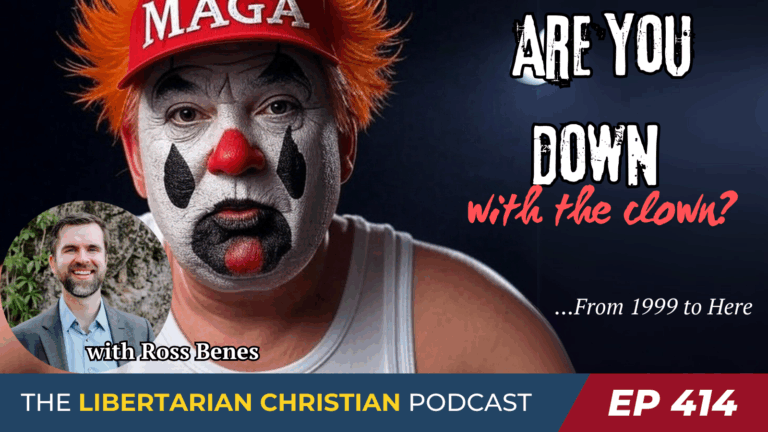

Discussion of the first subsection of the Reformed Libertarianism statement about culture. Also discussed are the significance of the fall into sin, common curse, redemption, and eschatology in relation to culture; as well as subjective sanctification of Christians’ cultural activity, contrast of neocalvinist with scholastic and biblicist (or theonomic) views, and transformationalism.
https://reformedlibertarians.com/004
| 00:00 | Introduction |
| 00:32 | Episode description |
| 00:55 | Subsection 1.a. human production |
| 01:30 | Defining culture Genesis 1:26-28; 2:15; 9:1-7 |
| 04:30 | The Reformed Libertarianism Statement & Principles |
| 04:44 | Why is understanding culture important? |
| 06:24 | The fall into sin and common curse Genesis 3:16-19; Romans 8:18-23; Ecclesiastes |
| 08:00 | Original prefall design of culture and eschatology |
| 08:43 | Postfall institutional differentiation; establishment of Covenant of Grace; Christ’s accomplishment of redemption and fulfillment of original mandate Hebrews 2:5-15 |
| 09:24 | Subjective sanctification of cultural activity By the application of Christ’s accomplishment of redemption in regeneration, Christians are enable to rightly recognize the reign of God in all areas of life, and in all those areas perform those activities to the ultimate end of God’s glory. This includes (however imperfect in this life) Christian good works (increasingly, according to the moral normativity of God’s abiding moral will), and increasing conformity to whatever other abiding norms God has established for human action generally, and for cultural activity. |
| 11:20 | Example: logical norms in creational revelation |
| 12:54 | Literal and figurative sense of fruitfulness |
| 15:00 | Temporal common curse on people, so also their labors and the world |
| 16:02 | The error of scholastic views of the relation of religion to cultural activity |
| 17:47 | Neocalvinism, against scholastic views, rejects the false idea that there can be any religiously neutral area of human life |
| 19:40 | Is this a “cultural Christianity”? |
| 21:25 | The error of theonomic views of Christian cultural activity |
| 22:13 | Neocalvinism, against theonomic views, holds that the Old (Mosaic) Covenant (and its law) is no longer in force, but has spiritual application for the church, and is not a model for believers’ cultural activity in the New Covenant era |
| 23:16 | A distinctively Christian view of cultural activity is a matter of discerning creational revelation as understood through the perspective of Scriptural teaching |
| 25:24 | What about so-called “transformationalism”? |
| 27:30 | Regeneration, and union with Christ in faith, involves our whole selves and lives. All our activity may be service to Christ (Colossians 3:23-24), not in conformity to philosophy that is not according to Christ (Colossians 2:3-4, 8), but rather transformed according to an understanding that all things are created by, through, and for Christ, moreover, and that in Him all things hold together (Colossians 1:16-17) |
| 28:48 | The reality of present futility because of the fall, even for believers; and the reality of present meaningfulness by the measure of final resurrection life in Christ 1 Corinthians 15:58 |
| 32:48 | Intro discussion between Pastor Nate Xanders and Gregory Baus on Reformed Libertarianism statement |
Audio Production by Podsworth Media – https://podsworth.com
The Christians for Liberty Network is a project of the Libertarian Christian Institute consisting of shows and hosts offering various perspectives on the intersection of Christianity and libertarianism. Views expressed by hosts and guests do not necessarily reflect the view of the organization, its staff, board members, donors, or any other affiliates (including other hosts or guests on the network). Guest appearances or interviews of any incumbents, officials, or candidates for any political, party, or government office should not be construed as endorsements. The Libertarian Christian Institute is a 501(c)(3) non-profit organization and does not endorse any political party or candidate for any political, government, or party office. For information about the Libertarian Christian Institute’s core values, please visit this page.
), //libertarianchristians.com/wp-content/plugins/smartquizbuilder/includes/images/template6-latest.jpeg))

), https://libertarianchristians.com/wp-content/plugins/smartquizbuilder/includes/images/template6-latest.jpeg))








































), https://libertarianchristians.com/wp-content/plugins/smartquizbuilder/includes/images/template6-latest.jpeg))
), https://libertarianchristians.com/wp-content/plugins/smartquizbuilder/includes/images/template6-latest.jpeg))
), https://libertarianchristians.com/wp-content/plugins/smartquizbuilder/includes/images/template6-latest.jpeg))





Sign up and receive updates any day we publish a new article or podcast episode!